#black expats
I, Anndi, am a serious foodie. About 99% of the reason I ever leave my house is to try new food. Since the city is jam packed with restaurants on every corner, it’s hard to know which ones are truly worth your hard-earned coins. Well I am here to help you! Below is a list of my Top 5 Favorite Places to Eat in Paris.
1. Gumbo Yaya
Fried Chicken? Collard Greens? HUSH PUPPIES?! By far my favorite place to eat in Paris and it has nothing to do with french food. With a cool hip-hop ambiance and cookout style decor, Gumbo Yaya is a great relaxed place to dine with friends. In all honesty, it’s not incredibly authentic soul food (having a southern family I’m a harsh critic), but the fried chicken is BANGIN’ and it beats going to a french KFC any day. It’s fairly priced, with a good sized portion meal being between 11-15 euros.

Pro Tip: Get the Big Homie or the Chicken&Waffle Burger. Thank me later.
3 rue Charles Robin, Metro stop Colonel Fabien (line 2)
2. Ménélik
If you have never had Ethiopian cuisine before, just know it is entirely TOO LIT. Food full of overwhelmingly savory flavors that is meant to be shared among a large group and eaten with your hands (Take lots of napkins). From the authentic ethiopian artwork, multi-colorful tapestries, and mesmerizing east african music, this spot bathes in authenticity. The best part is easily the free mystery wine you get before your meal. It will have you feeling good in no time. But if you feel like paying for alcohol, I would try Tej which is a wine brewed with honey.
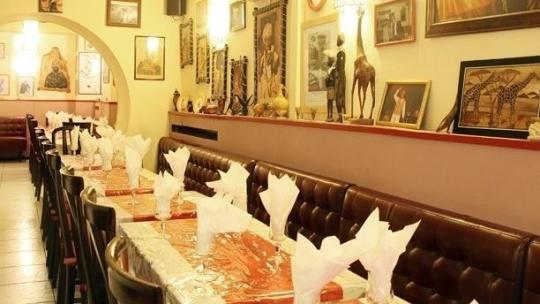
Pro Tip:Ask for more sourdough bread. You’re going to need it.
4 rue Sauffroy, Metro Stop Brochant (line 2)
3. HolyBelly
Oh, HolyBelly. Are we in old town Paris or gentrified Williamsburg, Brooklyn? It took two times of waiting in line for over an HOUR until I actually tried your savory goodness. But boy was it worth the wait! This French-American spot, located at the heart of the 10th, is a hipster haven and has perhaps the best brunch in town. With its impeccable attention to plate presentation, it has the most “Instagram-able” meals in the city. If you order the Savory Stack you will have dreams about it several weeks after.

Pro Tip: Try to get in line before 11am. After that its all over champ.
19 Rue Lucien Sampaix , Metro stop Jacques Bonsergent (line 8)
4. Churrasquiera Galo
This portuguese restaurant has a pretty underwhelming decor and even less impressive service. It’s small and has the community-style seating I loathe quite dearly. BUT the food is awesome!! The portion size is super generous by European standards and you can get a full, hearty meal for less than 13 euros! What’s best is that its located only a 8 min walk away from the Sacré-Coeur in Montmartre, the highest point in the city. It may not be phenomenal in all respects but the food makes it worth a lunch stop after sight-seeing.

Pro Trip:Only go if super hungry. Or wear stretchy pants.
69 rue du Dunkerque, Anvers (line 2), Barbes-Rochechouart (line 4)
5. La Crêperie Bretonne
My absolute favorite french meal is crêpes and galettes. Sweet or savory. I will take them however I can get them. PLEASE resist the temptation to try your first crêpe from a cheap fast food hole-in-the-wall in Saint-Michel and instead opt for one of the many tasty sit-downs on Rue du Montparnasse. This long, narrow street is lined with nothing but restaurants that specialize in this french delicacy. The most popular of these is La Crêperie Bretonne. I personally like to top my crepes with ham, egg, cheese, mushroom, and spinach but you don’t have to start or stop there! You will be overwhelmed by the options. So go here! Your taste buds will thank you for it.
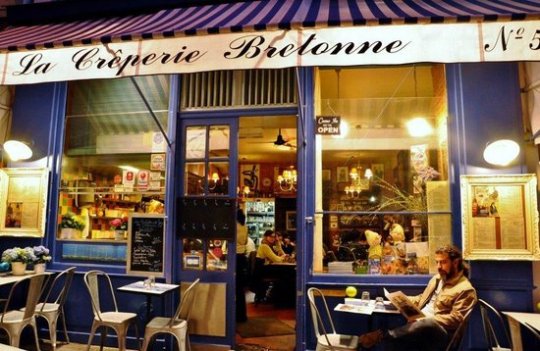
Pro Trip: Cider is the best pairing with galettes (savory crepes). Highly recommend!
56 rue de Montparnasse, Metro Stop Edgar Quinet (line 6), Vanvin (line 4), or Gare Montparnasse (line 4, 6, 12, & 13)
“Ugh I didn’t like France. French people are racist”“Go to Italy! They’re so friendly and I hear they love black women”“Do Germans even have black people outside of the military?”
It’s something almost every black traveller fathoms before venturing abroad. How will my blackness be perceived in this predominantly non-black space? It’s a valid concern. At best, our otherness might put us on a flattering pedestal. At worst, we might get mistreated. Even traveling to remote areas of the U.S you will find people that stare at you and ask aggravating questions like “Can I touch your hair?”. I certainly wondered about how I’d fare as a black woman before moving to France.
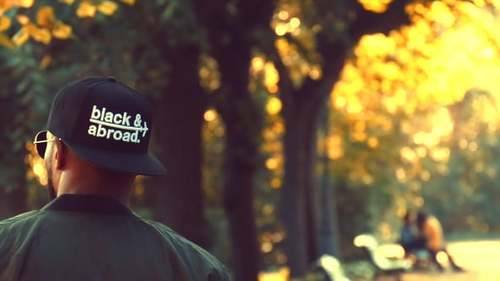
But this post is really not justabout me. Yes I am black. Yes I am in Europe. But that really doesn’t make me special. Because even though only a small percentage of African Americans travel to Europe yearly, there are tens of millions of black people that are already there: Afro-Europeans.
Black people don’t just live in Africa and the United States. Thanks (but like, no thanks) to colonialism, the African diaspora truly reaches some of the most unlikely corners of the earth. Most African Americans make the mistake of assuming that we are the only group of african descendants living as the underrepresented, mistreated, systematically oppressed minorities in predominantly white spaces. Tell that to the 55 million Afro-Brazilians. Or the millions of black descendants in the UK, Italy, and France.
But our egocentricism isn’t entirely our fault. I, too, had no idea exactly how many black and brown people lived in Europe until I came here. I assumed based on films, television, and images I had seen growing up that Europe is one homogenous white continent. Full of sameness with very little variation of color or culture (or at least not culture from an ethnic standpoint). It’s the invisible diversity of Europe. In the same way African-Americans lack representation in almost all facets of our society, Afro-Europeans lack it even more.

I had met a lot of people my first couple of months in France but I still felt something was missing. I yearned to connect with people that were like-minded. People in which I had an inevitable bond with. In short, I needed to make black friends. It sounds silly to some but anyone a part of a minority group in some way (race, sexuality, etc) understands this desire.
The problem was never the lack of black people, but how to organically make friends with them. Making friends as an adult is not an easy feat. When you’re a kid it’s so easy! All you have to do is say this:
But how do you tell a random person you think they’re kinda cool and we should hang out in the most platonic way possible without being creepy?
Several months later and I’ve met friends of friends, connected with random people through social media, and have even joined a Black Expats in Paris meet-up. By speaking with people I’ve gathered quite a few perspectives.
African Americans are both admired and envied in France. Believe it or not, we have the type of global visibility not afforded to others of the African Diaspora. African Americans are the examples of cool, the creators of pop culture. Our celebrities are their celebrities, our favorite TV shows are their favorites too. African Americans are vocal in periods of inequality and reactionary during times of social injustice. Mike Brown & Trayvon Martin are not only names uttered on American soil. “I Have a Dream” is familiar to all European ears, the “Black Lives Matter” cry has been heard around world and the Civil Rights Movement is a part of their curriculum just as much as ours. In short, the Black American experience has left a definite mark in world history.
For Black Europeans, however, their history tends to get shoved under the rug. I am not AT ALL an expert on this topic but here is a concise history of European colonization in Africa in my own words.
**Anndi’s Quick and Over-simplified History on the Conquest of Africa**
In the late 1800s, several European countries such as the UK, France, and Portugal had set up port cities in Africa for trading goods and resources. Everything was cool until this dude named King Leopold II of Belgium was like, “you know what would be awesome? My own territory in the Congo”. So homeboy sliced out a chunk of the Congo for his own PERSONAL benefit, not even in the name of Belgium. The other European powers (UK, France, Italy, Portugal, and Germany) started to freak out and thought, “Damn my ego is super big, how can I make it bigger?”. So they had a meeting in Germany, found a map of Africa, and literally cut the continent apart like slices of pizza. It’s worth mentioning that none of the African countries in question were invited to said pizza party. So NINETY PERCENT of the continent was colonized without permission,MILLIONSof Africans were forced into labor, resources were exploited, men were killed, women were raped, children were maimed, feuding ethnic groups were mixed…all under the guise that they were “saving uncivilized savages from eternal damnation”.
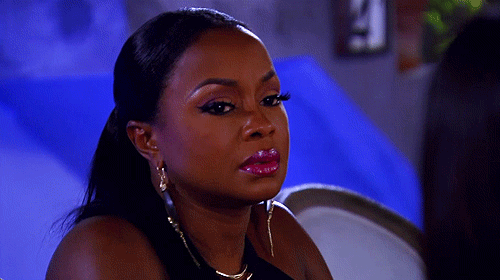
Flash forward several decades and the European Powers finally started to leave. Whether they left on their own accord or were driven out by revolutionary groups, the heinous effects of imperialism are evident for several African countries by way of corrupt governments, tireless civil wars, and psychological trauma.
**The End** ….Except not the end because these heinous effects still linger.
I’ve noticed a slight lack in community for Afro-French people. For African-Americans, there’s this idea of fictive kinship. I may not know you from Adam, but if we are the only two black people within a predominantly white space then we will acknowledge one another. But that’s only on a micro-level. On a macro-scale, we have become masters of creating spaces for ourselves. Hair salons & barbershops, Historically Black Colleges and Universities, BET Network, NAACP… we have a black national anthem!! All with the intent of uplifting and strengthening one another, for validating our place in a society not made for us.
But our sense of community derives from our shared experiences. Many of our ancestors were slaves. Many of our living relatives grew up in segregation. For France, and many other European countries, the experiences of black europeans, while similar, are not identical nor are they shared. At any rate, its hard to have a sense of community when you don’t even know how many people of African descent live in your country. Apparently, taking an ethnic census is constitutionally banned in France.
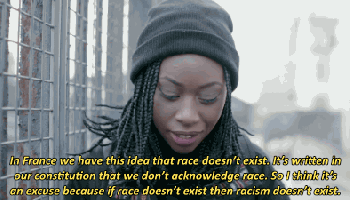
For Afro-french people, they’re not bound together by race as much as their family origins. If you’re a black woman from Guadeloupe, you might feel a bigger bond to people from the West Indies than to those from West Africa. Honestly, I envy greatly that Afro-Europeans know exactly where they come from and even have family that still live in those countries. I have never felt so shameful about not knowing my roots until moving here. Every time I meet an Afro-french person for the first time, the conversation goes as follows.
Them:So where are you from?
Me:I’m from the U.S!
Them:Yeah, I know. But like where are you really from?
Me: Washington, DC.
Them:What’s your family origin I mean to say.
Me:Um…I don’t know? My ancestors were slaves so…
Them:…..
Me:…..Nice meeting you!
In general, there’s this idea that black people are never really from whatever predominantly white country they reside in. Afro-french people can be born and raised in Paris and never feel or be seen as “french”. Even when I meet White Europeans, they are generally skeptical about my origin story but for a different reason. Because I have a lighter skin tone than most Afro-french, many assume that I am “métisse” or mixed. During my trip to Italy, an italian man told me “You’re beautiful. I love mulattowomen”. The assumption really bothers me because black and beautiful are not mutually exclusive concepts homeboy! But I do love their faces of disappointment when I tell them I am proudly, undeniably, 100% BLACK.
But let’s discuss some positives, for there are many. While Black French don’t organize against injustices in the same way we do, that doesn’t mean they aren’t having these important conversations. The Afro-fem movement seems to be really big here. I’ve seen countless articles, youtube videos, tweets, and have even been invited to conferences by Afro-feminists to discuss the interesting balance of race and gender.
I’ve met so many black french women who are smart and woke. Clever and funny. Women who want to be a voice for their community. Women who are artists, poets, and singers. Women who are beautiful inside and out. Women who are writers. Women who are fly. Women who are college educated. Women who want to uplift and strengthen their fellow sisters. Women who want to be a vessel for serious change in their society.

So don’t sleep on Afro-Europeans. They have a very real place in our world.
I would be remiss not to mention the Strolling Series by Cecile Emeke, which was in truth my personal introduction to Afro-European voices. Cecile Emeke is a British woman who brilliantly decided to film black individuals across the African diaspora. The result? Unraveling the generalized blanket of our black experiences into singular, personal threads of testimony. Emeke has filmed in the Netherlands, Italy, Jamaica, and many other countries and its widespread appeal has garnered a huge Youtube following. Of course, you’ll hear the familiar stories of micro-agressions, respectability politics, and self-love affirmation. But you’ll also hear views on mental health, sexual orientation & expression, capitalism, veganism, colonial reparations, and a plethora of other subjects not often heard from black standpoints.
If you’re interested, I would start with one of my three favorites: Two Black Friends in France ,One Black Male Feminist from the UK, orA Black Actress in London.
So what does it mean to be Black in Europe? I have the same answer for someone who would ask what its like to be black in the U.S. There is no simple answer. The culture, the attitudes, the ideas, the joys, the struggles of black people are not monolithic. They are varied. They are nuanced. They may intersect but they don’t coalesce.
I write this to say there is more to the black experience than what you have experienced personally. I think its important not only to have conversations on blackness within the US but in a global context as well. And lets remind ourselves that as Black Americans, our global visibility gives us a certain level of privilege. The next time you say #BlackLivesMatter, mentally expand that demand outside of North America. When you think of the black community, challenge yourself to think beyond your own borders.
And if you’re able, travel abroad. Talk to people. Have these discussions. Your eyes and minds will open wider than you know.

Conjugation, subject-verb agreement, verb tenses…is there anything more clinical than learning a language at school? While these are all necessary elements of language learning, real fluency is born from listening to native speakers in their natural element.
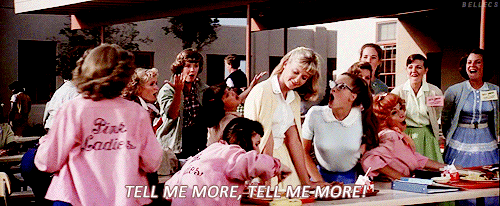
I’m talking about the type of mannerisms and peculiarities even native speakers don’t know about themselves! Sure you can write a 10-page essay in impeccable french, but can you gab with the girls at the hair salon? Here are the five language nuances your teacher won’t teach you.
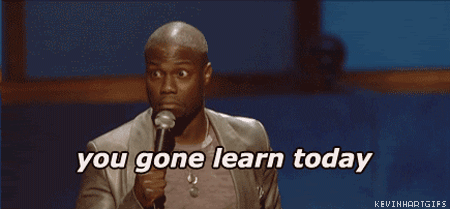
1. Inflections
Languages don’t sound the same. That’s an obvious statement. But even the inflections and vocal tones don’t necessarily translate. For example, in english, depending on the context, we don’t necessarily need to go up at the end of a question. But in french, its essential. I’ve even been told before that even though my american accent is often undetectable, I speak in an american rhythm. I’m not sure what that means but it just emphasizes how these subtle idiosyncracies can make the difference.
2. Interjections
I always thought interjections were intuitive. Actually, I never thought about them much at all until I moved to France. But I quickly realized that interjections are a learned part of language. If you stub your toe, you’re not going to say “ouch”. You should say “Ouïe”. If you eat something gross, you’ll get quite a few looks if you say “yuck” instead of “Beurk”. Even animals aren’t safe. Ducks don’t quack and pigs don’t oink. One of my classes (embarrassingly) had me imitate the entire animal kingdom because they found the differences so peculiar. At any rate, it’s definitely worth looking these interjections up because they’re a huge part of language.
3. Facial Expressions
The french are quite facially expressive people. It’s quite entertaining as an outsider and all expats notice this right away. My favorite expression is the dumbfounded look my students give me when they have no idea what I’ve said. They widen their eyes and puff their cheeks like a blowfish…it’s hilarious. You can see that look HEREat 0:49. But what struck me most is how uniform that look is, which indicates that is cultural more than it is individual.
4. Hand gestures
The french start counting with their thumb instead of their index finger, the “Ok” sign actually means “zero”, and rubbing your nose means you’re drunk. Hand gestures are definitely cultural. It’s recommended before going to any country to look these up because you may think you’re giving the thumbs up but instead you’ve just started a fight in public. Typically, you won’t find these cultural differences in a textbook.
5. Idioms
One day I asked a friend what she thought of this guy she was seeing.
Her response: “Il est sympa, mais il se regarde le nombril (He’s nice but he looks at his bellybutton).
My first thought: “….That’s weird”
What I didn’t know (and didn’t find out until a week later) was that se regarder le nombril is an idiomatic expression that describes someone as egotistical or narcissistic.
Idioms are a little harder to prepare yourself for because the possibilities are endless and often the expression holds very little indication of what it actually means. However, whenever you hear one try hard to remember it and challenge yourself to use it in another situation.
Have you ever been carried by a French firefighter to the hospital?
I have.
Last week I was set to leave for Rome for 5 days with a friend. I was practically skipping with excitement days prior. I learned rudimentary italian on Duolingo, I watched the Lizzie McGuire Movie in preparation, and I fantasized about buttery noodles I can’t pronounce while practicing various poses for Instagram. I was ready! After being in wine and cheese France for 6 months, I couldn’t wait to get a taste of another culture.

Seven hours before take off, I get on the bus to the airport. (I live really far away and had planned to meet my friend at her house beforehand). As I’m still searching for a seat, the bus goes Herby Fully Loaded on me and totally throws me off balance. Before I know it I’m on the floor bleeding from my leg on a bus full of a people. No one offered to help me. Gotta love the french!
I boogie-board the bus all the way to the train station. It’s 11pm and only the most precarious characters are around. My jeans and brand new white converses are now soaked in blood. *Cue nervous laughter* as I realize I look like the Walking Dead. So I limp-run through the platform in search of a bathroom. I finally find one not occupied by a homeless man but only to find out theres no toilet paper or paper towels. Parfait.
Being the adult that I am, I call my daddy 6,000 miles away for advice. “ You should probably go to a hospital”, he suggests. Of course. Why on earth didn’t I think of that?
I try to call 911 and then remember that 911 is an American emergency number. What’s the French emergency number. WHY on earth don’t I know this?!?! I’m a terrible expat.
Six hours before take off and I am officially panicking. Because I’m in a train station in Nowhereville, France, I decide to (literally) hop on the train to the next more populated station. I get there to find it equally deserted. But that’s when Antoine the Firefighter saved found me. He calls an ambulance and it arrives in lightening speed. Antoine decides to board the ambulance like the gentleman he is. Antoine is cute. I’m in love with Antoine. He starts asking me all these personal questions, like where I live, what I do, and my phone number. Naturally I start flirting back until I realize he’s just filling out out my medical release form.

I’m wheeled into the ER, large suitcase in my lap, to find everyone and their mother and their mother’s mother waiting on a doctor. All I can think about is Rome. “How long is this going to take? I have a flight to catch!” Must. Have. BUTTERY NOODLES. My desperation earns me a seat at the front of line. I even cut a sick baby and woman that looks like the Crypt Keeper but scarier.
Five hours before take off and I finally see a doctor. His name is Doogie Howser. Seriously how old was this kid? After clumsily applying anesthesia, Doogie administers six sloppy stitches to my shin. I can tell he’s as nervous as I am because his hand is shaking and he keeps asking the real doctor, “is this good?”. I’m too anxious to care because all I can think about is my flight and the fact that my white shoes are ruined. Mind you I am documenting this entire ordeal on Snapchat because I’m a millennial and thats just what we do.

Four hours before take-off and I am unceremoniously released from the ER with a long list of prescriptions. I have no idea how I’m supposed to pick up said prescriptions considering its 2am and none of the pharmacies are open until after I leave for Rome. “Italy has pharmacies too” , says the sassy, disgruntled front desk lady.
Three hours before take-off, I finally meet up with my friend at her house. The airport is 25-30 minutes away from her house but because we’re cheap we decide to take an hour long night bus for 2 euros instead of a 40 euro taxi. I don’t know what type of people I expected to be on the bus at 3am….but the sketch parade was in full force. Every stop the passengers are creepier than the last. They bus lights were dimmed, the rain came down hard, and the windows were so foggy we couldn’t even see the buildings. We clung to one another the whole 60 minutes.
Ten minutes before take-off. The anesthesia is starting to wear off, I’ve thrown back some Ibuprofen, and I’m sitting window seat next to a priest. The meds kick in just in time for take off and I realize I haven’t slept in almost 24 hours. I knock out before the plane even leaves the ground. The End.
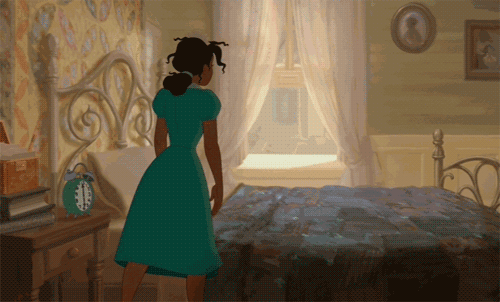
What Did We Learn:
- Don’t take public transportation by yourself after midnight.
- Always know the emergency numbers in whatever country you’re in.
- Ask more questions on the credentials of people operating on you (if need be).
- Trust french firefighters, especially if his name is Antoine.
